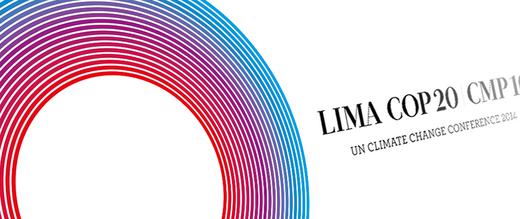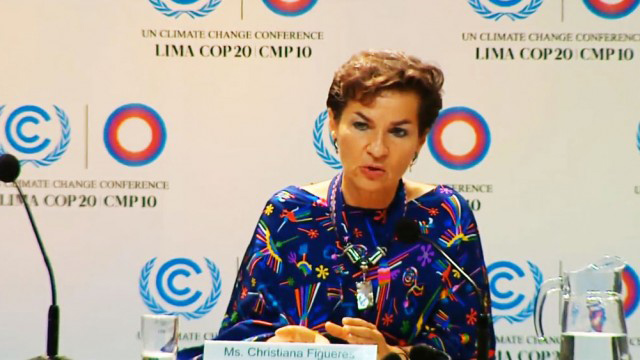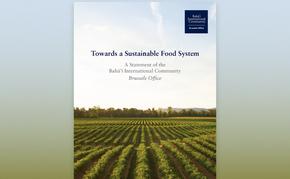The views expressed in our content reflect individual perspectives and do not represent the authoritative views of the Baha'i Faith.
The world’s major polluters—the so-called “first-world” industrialized countries—will soon accept or reject the planet’s most important agreement ever on climate change.
Meeting now in Lima, Peru (from December 1-12), the United Nations Framework Convention on Climate Change (UNFCCC) will try to negotiate an international draft agreement limiting carbon emissions, with the goal of every nation signing a universal treaty to implement significant reductions at the 2015 Paris Conference, to be held a year from now.
[You can listen to the live sessions of the UNFCCC conference (in Arabic, Chinese, English, French, Russian or Spanish) here. Also, you can see the response of the world’s indigenous communities to climate change here.]
Early in this year’s conference in Lima, the European Union delegation put forth a bold new proposal—that every country in the world adopt legally-binding carbon reductions by next year’s Paris meeting.
The head of the European Union’s delegation, Elina Bardram, said “The EU is of the mind that legally-binding mitigation targets are the only way to provide the necessary long-term signal, the necessary confidence to the investors, and provide credibility in the low carbon transition worldwide.”
So far, few major industrialized nations have ever committed to legally-binding emissions targets. To date, since the first UNFCCC gathering in Rio de Janeiro in 1992, all emissions cuts, in each round of agreements, have been voluntary.
The EU proposal ratchets up the pressure on other major polluting nations—the United States, China, Australia, Canada and Russia—to drop their previous objections to a legally-binding Paris agreement.
Some signals indicate that could potentially happen. In October, China and the United States agreed to reduce their carbon emissions to between 26-28% (of 2005 levels) by the year 2025. Also in October, the EU’s twenty-eight member nations agreed to legally-binding cuts of 40% (of 1990 levels) by the year 2030. Both of those pledges, while indicators of some progress, fell short of the non-binding voluntary commitments each had previously made. [For an interactive United Nations world map that gives information on all countries and their pre-2020 emissions reductions commitments, click here.]
Despite increasingly dire findings from the global scientific community about the catastrophic effects of climate change on the world’s economy, security and environmental viability, the UN’s climate chief Christiana Figueres said enforcing such legally-binding climate agreements would be more of an “art than a science—because there are no environmental police.”
Perhaps that fact needs to change. During the 22 years since the initial Rio climate conference, many if not most nations have repeatedly agreed to carbon emissions reduction targets which they subsequently failed to meet. Some large industrialized nations like Germany and Brazil have shown such targets are achievable—but the unrelenting focus on economic growth, especially in the fossil fuel energy sector (coal, oil and natural gas), has always severely hampered reaching the goals of most nation’s targets.
A year before the Rio agreement in 1992, the Baha’i International Community strongly recommended one overarching principle to consider in the Earth’s environmental negotiations:
…acceptance of the oneness of humanity is the first fundamental prerequisite for this reorganization and administration of the world as one country, the home of humankind. Recognition of this principle does not imply abandonment of legitimate loyalties, the suppression of cultural diversity, or the abolition of national autonomy. It calls for a wider loyalty, for a far higher aspiration than has so far animated human efforts. It clearly requires the subordination of national impulses and interests to the imperative claims of a unified world. It is inconsistent not only with any attempt to impose uniformity, but with any tendency towards excessive centralization. Its goal is well captured in the concept of “unity in diversity.”
The Baha’i Writings envision the world federal system proposed by Baha’u’llah as one “in whose favour all the nations of the world will have willingly ceded every claim to make war, certain rights to impose taxation and all rights to maintain armaments, except for purposes of maintaining internal order within their respective dominions.” Such a world commonwealth will include “a world legislature, whose members will, as the trustees of the whole of mankind, ultimately control the entire resources of all the component nations, and will enact such laws as shall be required to regulate the life, satisfy the needs, and adjust the relationships of all races and peoples. A world executive, backed by an international Force, will carry out the decisions arrived at, and apply the laws enacted by, this world legislature, and will safeguard the organic unity of the whole commonwealth. A world tribunal will adjudicate and deliver its compulsory and final verdict in all and any disputes that may arise between the various elements constituting this universal system.” Under such a system, “a single code of international law — the product of the considered judgement of the world’s federated representatives — shall have as its sanction the instant and coercive intervention of the combined forces of the federated units…” At the same time, “the autonomy of [the] state members and the personal freedom and initiative of the individuals that compose them [will be] definitely and completely safeguarded.”
Baha’is the world over… believe that, empowered by the universal recognition of the dangers presently facing the planet, the governments of the world can be moved to act courageously on behalf of the human race as a whole. The result may well prove to be not only an effective response to the environmental and developmental problems now facing us, but another enormous step forward in the building of a federal system able to take up the entire array of challenges confronting a rapidly integrating human race. – International Legislation for Environment Development, August 13, 1991, Baha’i International Community.


















Comments
Sign in or create an account
Continue with Facebookor